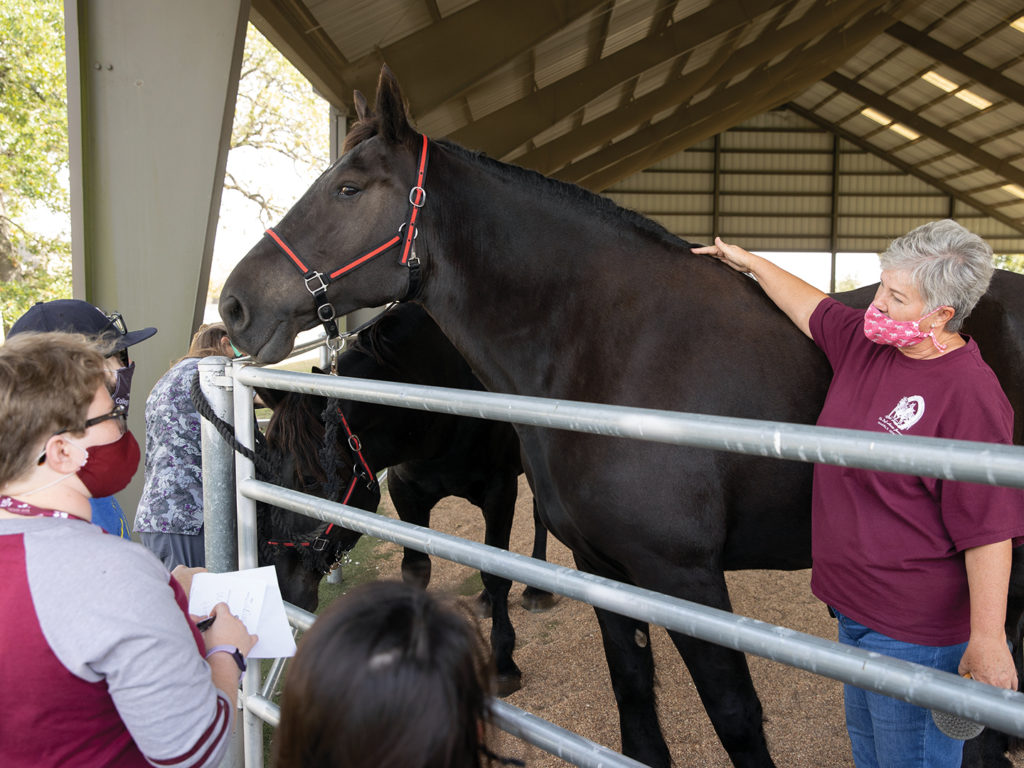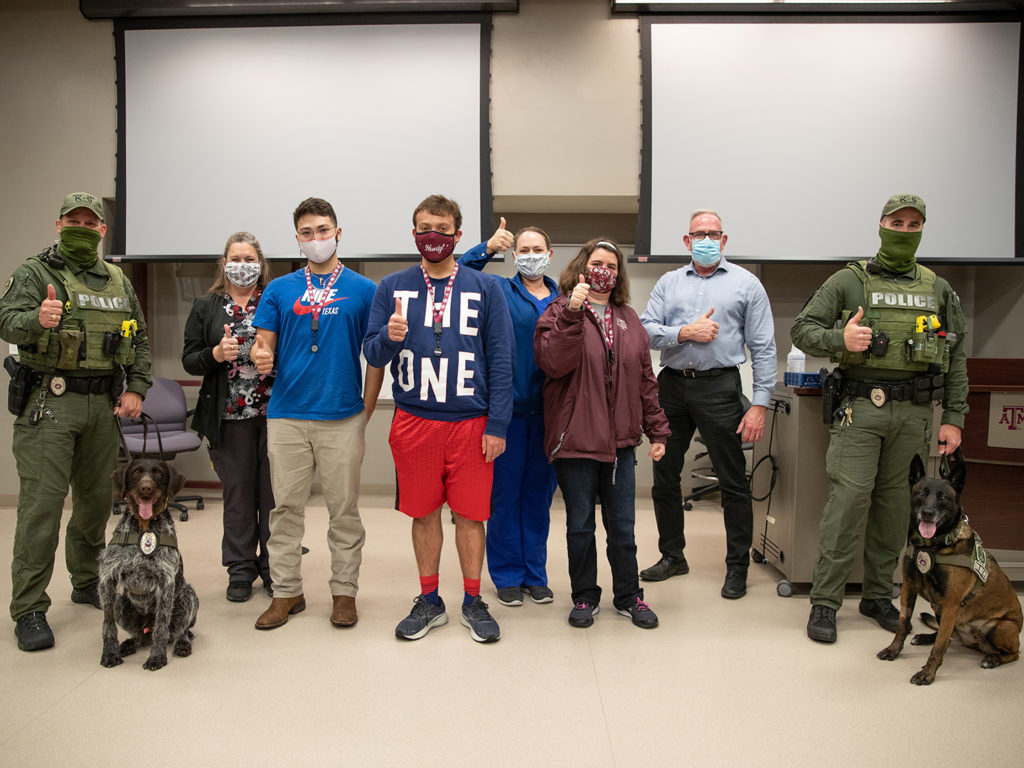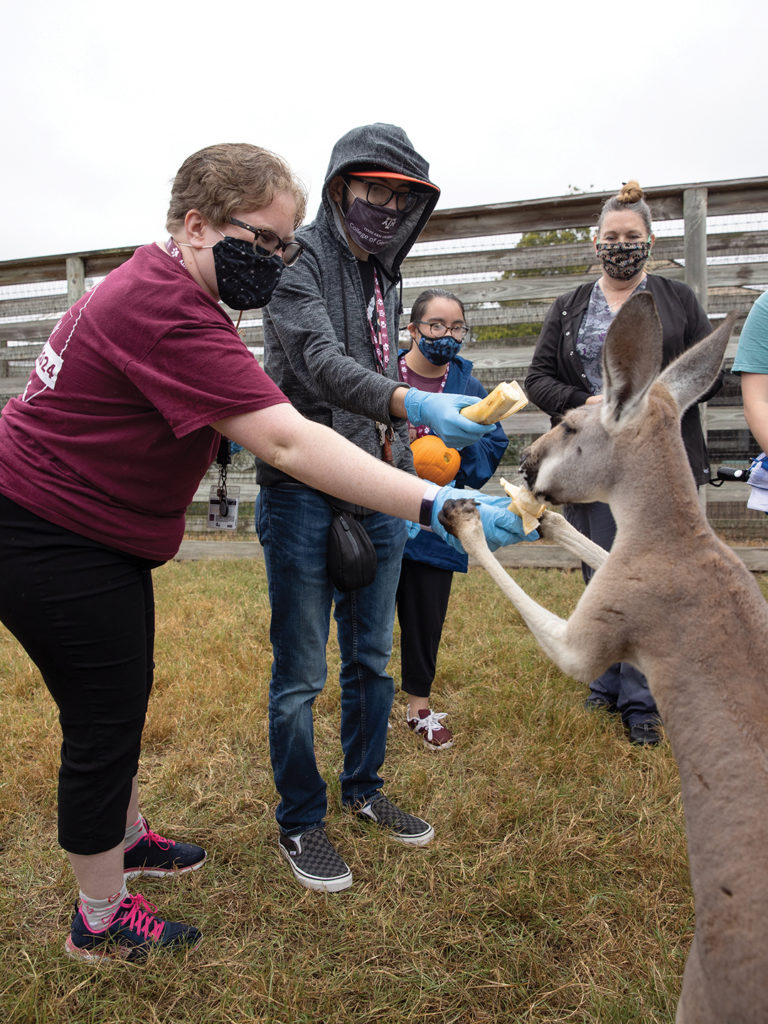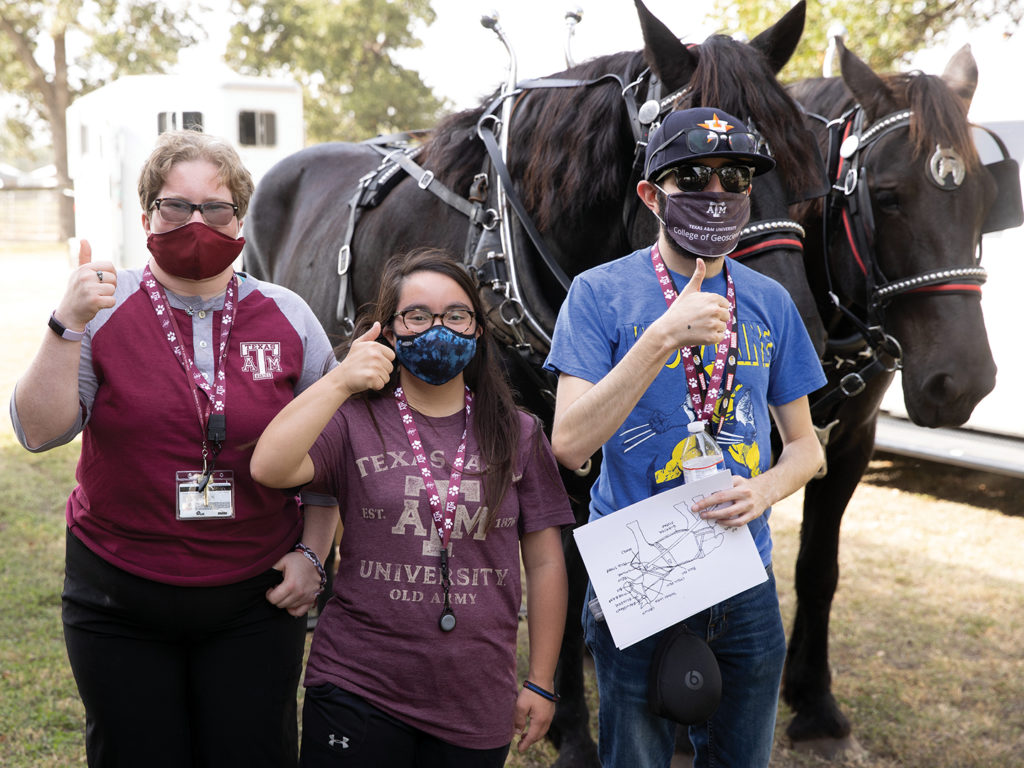CVMBS’ Aggie ACHIEVE Course Provides Valuable Learning Opportunities For Students With Disabilities
Story by Megan Myers, CVMBS Communications

When the students first saw the two massive, black-as-night Percheron draft horses, their faces filled with excitement and joy. Some of them had never interacted with a horse and they couldn’t wait to approach the gentle giants.
These young adults were visiting the Texas A&M College of Veterinary Medicine & Biomedical Sciences (CVMBS) as members of Aggie ACHIEVE, a program at Texas A&M University for students with intellectual and developmental disabilities (IDD).
Aggie ACHIEVE, a four-year postsecondary education program, allows young adults with IDD to pursue their interests, have a genuine college experience, participate in on- and off-campus internships, and earn a Certificate in Interdisciplinary Studies from Texas A&M University that will aid them in applying for jobs.
In fall 2020, the CVMBS began offering the trailblazing course Animals in Society as part of the program, setting new standards for inclusivity as the first veterinary college in the United States to offer a course for students with IDD.
The draft horses Raven and Rook visited the college in September for one of the course’s weekly class sessions. Their owners, Doug and Debbie Halford, are members of the Texas Draft Horse and Mule Association and regularly give draft horse demonstrations.
The lesson began with the students taking a few minutes to pet and brush the horses while the Halfords discussed draft horse care and the history of their use in farming and war. Afterwards, the Halfords showed how they prepare the horses to demonstrate their impressive strength, and the class ended with the students riding a sled pulled by the horse team.
While learning about the draft horses, and in all of their other Animals in Society classes, the Aggie ACHIEVE students are given a new perspective on the various roles working animals can play in their lives.
Expanding Inclusivity And Animal Appreciation

The Animals in Society course was created by Dr. James Herman, a clinical professor in the CVMBS’ Department of Physiology & Pharmacology (VTPP).
“I was the chair for the university’s undergraduate curriculum committee when they started this new program called Aggie ACHIEVE,” Herman said. “I thought it was something that we at the college could help with, because I’ve worked with people with varying disabilities and they usually find animals so captivating.”
To promote an inclusive community on campus, all Aggie ACHIEVE courses are conducted with a combination of ACHIEVE students and traditional undergraduates, with differing requirements for each set of students.
Animals in Society currently has six students enrolled, three of whom are members of Aggie ACHIEVE.
“All three of the Aggie ACHIEVE students love animals and they’ve never seen these types of things before,” Herman said. “After 20-something years of teaching, I enjoy doing something that’s just fun.”
For each class, Herman covers a new subject related to animal history, working animals, or animal care, with teaching assistance from veterinary technicians Mandy Zachgo and Lisa Roberts-Helton.
Topics include the history of animal domestication, animal first aid, and the various types of working dogs and the important roles they play in our society.
“It’s a great experience for them and it’s actually great for us, too, because we get more people thinking about how animals are not just pets—they can be workers,” Herman said. “If these students see a working dog, they now know that the dog is doing a job and that it’s not a pet.

“I’m trying to give these students the opportunity to have a more expanded view of working animals and to have a greater understanding of these animals that they’re likely to encounter in everyday life,” he said.
Typically, lessons include an interactive, in-person experience for the students, like the draft horse demonstration. The class also has received visits from the Texas A&M police explosive detection K-9s Jackie and Tyson and has visited the Texas A&M Veterinary Emergency Team response hub and the Texas A&M Winnie Carter Wildlife Center.
During one visit to the Wildlife Center, the students took a tour to learn about the exotic species housed there, and then created toys for the animals out of pumpkins.
“The students made holes in pumpkins with melon ballers and stuffed the pumpkins with grapes and banana pieces for the herbivores and pieces of meat for the exotic cats,” said Dr. Alice Blue-McLendon, director of the Winnie Carter Wildlife Center. “It was educational for them and they enriched the animals’ lives. I think they enjoyed watching the animals try to get the hidden food items; so, overall, it was a great success.
“With this group of students, they seem to really like animals, in general,” she said. “They were delighted to see the animals and Lisa Roberts-Helton reports they really loved our six white-tailed fawns that we’ve been bottle raising and that those were their favorites.”
Providing New Opportunities
Unlike most Aggie ACHIEVE courses that are developed from an already-existing undergraduate course, Herman chose to create a brand new class for the program, which then had additional requirements added for the undergraduates enrolled.
“The undergraduates have to do research projects, while the Aggie ACHIEVE students will identify an animal-related agency, like K9s4COPs, and do a report on it at the end of the semester,” Herman said.
“Dr. Herman approached the Aggie ACHIEVE program about designing a class with our students in mind,” said Dr. Olivia Hester, the program director for Aggie ACHIEVE. “It’s not every day that an instructor approaches the program about including our students in their classes.
“Each of the three Aggie ACHIEVE students currently enrolled in Animals in Society have stated that it has been their favorite course so far,” she said. “The hands-on experiences of this course have also made the students want to explore possible careers working with animals. I think Dr. Herman sees the value of inclusive classrooms for not only students with disabilities but for other students in the course as well.”

The goal of Aggie ACHIEVE is that after completion, the students will be prepared to find and succeed in jobs that match their strengths and interests.
“A fair number of the students in Aggie ACHIEVE are very interested in working at a veterinary clinic at some point in their life, so my goal for next semester is to begin to set up internships with a technician for them,” Herman said.
Julia Gault, an Aggie ACHIEVE freshman enrolled in Animals in Society, hopes to work as a veterinary assistant after she completes the program. She chose to take this class to learn more about animals.
According to her, the course has confirmed her desire to work with animals and has taught her information that will be extremely helpful in her future job.
“The class is so much fun,” Gault said. “I really love it. Dr. Herman is awesome.”
###
Note: This story originally appeared in the Spring 2021 edition of CVMBS Today.
For more information about the Texas A&M College of Veterinary Medicine & Biomedical Sciences, please visit our website at vetmed.tamu.edu or join us on Facebook, Instagram, and Twitter.
Contact Information: Jennifer Gauntt, Director of CVMBS Communications, Texas A&M College of Veterinary Medicine & Biomedical Sciences; jgauntt@cvm.tamu.edu; 979-862-4216


